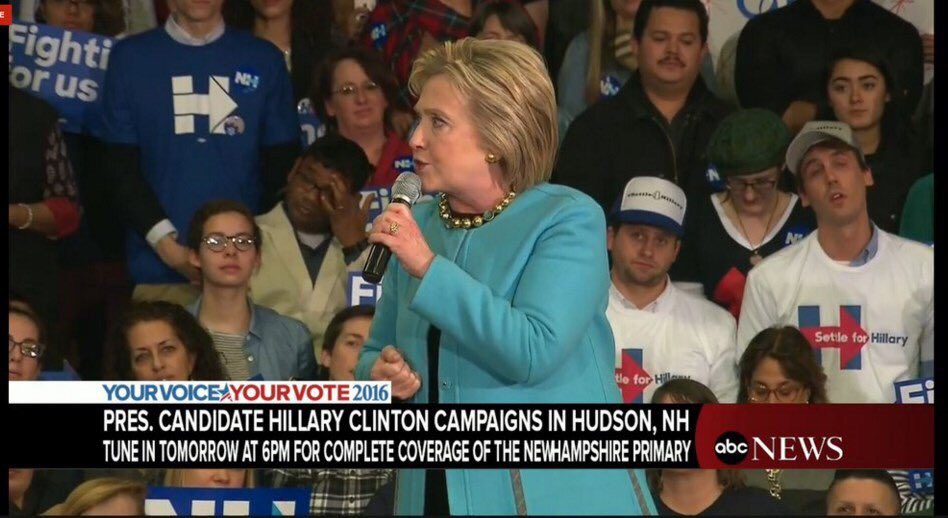We'll see how the revolution plays out over the next couple of weeks. With Bernie's blowout holding up -- almost 61% to her 38% -- the focus turns to whether Nevada and South Carolina, where more orthodox Democrats do most of the voting -- can be Clinton's firewall.
There's at least a hint that some reshuffling is coming (my emphasis).
By ABC NEWS ANALYSIS DESK Feb 9, 2016, 9:46 PM ET
Sanders won women by 53-46 percent, as well as prevailing far more widely among men, 65-34 percent. Sixty-nine percent of women under 45 backed Sanders (including 82 percent of those under 30 women), while Clinton won women 45 and older by 56-43 percent.
By ABC NEWS ANALYSIS DESK Feb 9, 2016, 9:46 PM ET
Nonwhites roughly divided, 52-48 percent, Clinton-Sanders.
The Clinton campaign response to the shellacking:
Asked about polling data showing that Sanders had won independent voters by an overwhelming margin in New Hampshire, Clinton communications director Jennifer Palmieri was quick with a comeback.
“Most of the states we’re going to now, Democrats vote in them,” she said. “Not independents.”
Palmieiri -- unwittingly, I can only presume -- revealed Hillary's precise general election weakness with that statement. Democrats don't win in November without young people and independents.
Citing the exit polls, which showed Sanders winning 83 percent of voters under the age of 30 and 72 percent of independents, (Sanders’ New Hampshire communications director Karthik) Ganapathy said he had “two takeaways” from Sanders’ performance in the Granite State (where “undeclared” voters are allowed to cast ballots in either party’s primary).
“Young people and the independent, undeclared voters — they came out and they made the crucial difference in this election,” Ganapathy said. “People think they’re sort of unreliable. But they’re here and they’re voting.”
There is still a long way to go with regard to Latino and African American Democrats. Clinton holds big leads in both the Nevada caucuses and the South Carolina primary, but the latest polling there is quite old; the most recent conducted a week before before Iowa. The news to anticipate in both states is whether there has been any movement.
As for the indies, they broke 42% Republican and 40% Democrat, with higher vote totals -- 216 K versus 242 K -- on the red side as well. That worked out as well for Trump as it did for Sanders. The Donald doubled up John Kasich, who placed second, with Bush, Cruz, and Rubio all bunched together in third, fourth, and fifth.
It's over for Fat Bastard. His Saturday night beatdown of Marco Ruboto did not translate into any momentum; he ended the night with the sixth place ribbon at 7.5% and is going home to New Jersey to "take a deep breath". Expect the JP to pronounce his campaign's death later this morning.
Trump and Cruz still look like the front-runners to me, with Rubio (or not) and Kasich and -- to a much lesser degree, Bush -- all fighting it out in Nevada and South Carolina.
Texas will have its early votes in the can -- historically about half the total -- before we know any results from the Palmetto State. So trends and momentum are the thing to watch for in both primaries.
I swear I've got a Texas post coming.




